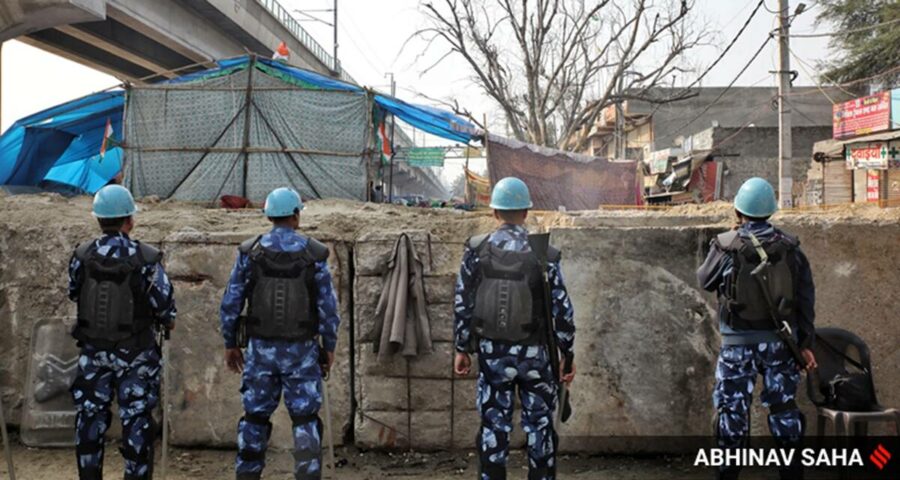Here are four reasons which connect the protest with the Union budget and your income.
Written by Nikhil Damodaran
The US taxpayers ended up paying for the wall which was Donald Trump’s key campaign statement. Similarly, Indian taxpayers will most likely end up paying for iron nails on the concrete, the barbed wire fences, the immovable boulders, and the wage labourers who were employed to erect the wall between protesting farmers and Delhi. Well, you certainly would if you are a tax-paying, income-earning deshbhakt. It does not matter if you support the cause or get anguished by it. It does not matter whether you worship Ram or pray to Allah. What matters is the fact that government expenditure will invariably come and bite you as taxes in the future and this time it would sting. Here are four reasons which connect the protest with the Union budget and your income.
First, all central government expenditure is procedurally sanctioned by Parliament after the budget is presented by the finance minister. Thus, either the funds provided to the Delhi police would come from the money already sanctioned to them or they would have to come from a special request to parliament in anticipation of expenditure. In either case, it is going to be paid forth by taxes on you and me — either on our incomes or GST. However, there is a procedural nuance which we need to understand.
The money first allocated to the budget needs to be ratified by a parliamentary sub-committee, but this does not always happen. If a certain sum in not ratified by Parliament, then it is guillotined, that is, passed as if everyone agrees to it. Our money, which was taxed by the government, finds its way into the hands of the Delhi Police, which then digs a hole in our pockets as well as cordons off our farmers in our own country.
Let us assume that the Delhi police did not have the money to meet their expenses— there have been many protests in the national capital region. The next step for individuals is to take a loan from the bank or to borrow from friends. But for the Delhi police to get more funds, all it needs is to get an additional request to Parliament. Historically, such requests are not discussed in detail and are sanctioned without scrutiny. But it is sufficient to say that the actions of the government are our voices, and our voices are creating a barricade using our toil.
Second, if we think about our past actions, we will find the year, months and more precisely the days when we cemented this wall against the farmers. We did this somewhere between April 11, 2019, and May 19, 2020 — the duration of the 2019 Indian general election in which this government was sanctioned by our votes. When we vote, the economic ramifications of our consent are often too complicated to understand, and hence political theatrics dictates the swing. But now we must stop and understand the consequences of our consent.
More importantly, our simple choice of voting has led to a scenario where there is no singular opposition to the government in a parliamentary democracy. This political plight also intensifies perverse economic incentives. Without adequate checks and balances, neither is the initial budget examined for its allocation nor are the subsequent additional requests validated. Thus, what seems to be mere political one-sidedness gets fuelled with taxpayer’s money into an institution which is devoid of counterbalances. Somehow, we do not understand the true ramifications of our vote.
Third, all government expenditure need not be paid now, but all government expenditures must come out of taxes either current or future. Thus, the sanctioned amount to building the walls and deploying the force in Delhi borders is financed by revenue accumulated previously and sanctioned in the budget. There is a possibility that you do not have to pay for this protest if the government borrows to pay for such expenditures. This leads to the fiscal deficit, which for the central government is projected to be 6.8 per cent for the next fiscal year, which assumes an ambitious growth target. Only if the government maintains its income in line with its projections will it be possible for it to limit the deficit to 6.8 per cent.
This deficit is going to affect you when you grow old in two ways. To pay for the fiscal deficit the government amasses now, it could increase indirect taxes in the future which would imply higher commodity prices when you are older. This is assuming the possibility that it cannot borrow any more in the future. It could also imply fewer government services because it is constrained in its spending. Thus, the actions of the government now are going to decide your economic pathways.
The fourth and final point is that you could still do something about it. When you push for the government to be more accountable, you are forcing your elected representatives in the Parliament to ask pertinent questions about budget allocation — all of which is your money at the hands of the government. There is another way you could make the government accountable: By becoming an aandolan jeevi. You could and you should go out there in the streets and ask these questions, demand an explanation. In fact, to uphold democracy, voting is the minimum you must do, but you should go out there and talk to your elected representative and ask them about the budget. It is your right to know, and you should know who paid for the wall erected between the farmers and the government in Delhi.
The writer is assistant professor, Jindal School of Government and Public Policy.
Source: Read Full Article


